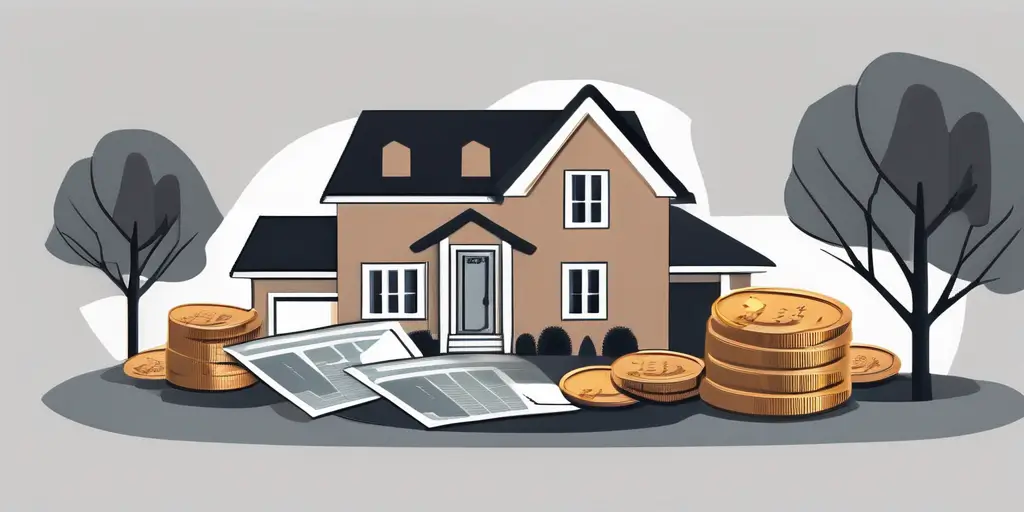When you decide to sell your home, it’s crucial to understand the various tax implications that may arise from the transaction. The sale of property can lead to gains that are subject to taxation, and navigating these implications can be complex. This article will guide you through the foundational concepts of home sale taxation, the exclusion rule for capital gains, and additional considerations that may affect your tax responsibilities.
Understanding the Basics of Home Sale Taxation
Home sale taxation primarily revolves around capital gains. Understanding capital gains and how they are calculated is fundamental to assessing your tax obligations when selling your home. In essence, if you sell your home for more than you paid for it, the profit made on the sale is known as a capital gain.
There are generally two types of capital gains that can occur: short-term and long-term. Short-term capital gains arise from properties held for less than a year and are taxed as ordinary income. On the other hand, long-term capital gains apply to properties held for over a year and usually benefit from lower tax rates, which can be more favorable for sellers.
The Role of Capital Gains in Home Sales
As you prepare to sell your home, it’s important to calculate any capital gains accurately. This involves determining your basis in the home, which is generally the original purchase price plus any substantial improvements made over the years. The capital gain is then calculated by subtracting your adjusted basis from the selling price.
For instance, if you purchased your home for $300,000 and sold it for $500,000, your gross capital gain would be $200,000, before considering exemptions or deductions. This simple calculation can sometimes become more complicated with additional factors, so it’s wise to maintain precise records of your purchase and improvement costs. Furthermore, understanding the nuances of what constitutes an improvement versus a repair can also impact your basis. For example, a new roof or a kitchen remodel may increase your basis, while routine maintenance such as painting or fixing a leaky faucet typically does not.
Primary Residence vs. Investment Property: Different Tax Rules
The purpose of the property dictates the tax rules that apply. If the home is your primary residence, different tax exemptions may apply compared to selling an investment property or a second home. For primary residences, individuals may qualify for capital gains exclusions, allowing them to exclude a significant amount of the gain from their taxable income.
Conversely, investment properties often lack such exclusions. While you may still be able to deduct certain expenses and depreciation, the entire profit from the sale generally is subject to taxation. Knowing which category your property falls into can significantly influence your tax liabilities. Additionally, if you have owned the property for a long time, you may also want to consider the implications of depreciation recapture, which can further complicate your tax situation. This occurs when you sell an investment property that has depreciated in value for tax purposes, potentially leading to a higher tax bill than anticipated. Understanding these distinctions and planning accordingly can help you navigate the complexities of home sale taxation more effectively.
The Exclusion Rule for Capital Gains
In many situations, homeowners can benefit from the exclusion rule for capital gains. Under current tax laws, individuals can exclude up to $250,000 of capital gains from the sale of their primary residence, and married couples can exclude up to $500,000.
This exclusion applies only under specific conditions, particularly around the duration of ownership and residency in the home before the sale. Homeowners should familiarize themselves with these conditions to see if they can maximize their tax benefits during a home sale.
Qualifying for the Exclusion
To qualify for the exclusion rule, you must meet three main requirements. Firstly, you must have owned the home for at least two years within the five years preceding the sale. Secondly, you must have used the home as your primary residence for at least two of those five years. Lastly, you cannot have used the exclusion on another home sale within the two years prior to the sale.
It’s essential to keep these qualifications in mind if you wish to take advantage of the available capital gains exclusion. Adequate record-keeping can help prove your eligibility for the exclusion and prevent potential tax liabilities.
Limitations of the Exclusion Rule
While the exclusion rule offers substantial benefits, there are limitations worth acknowledging. If your profit exceeds the exclusion limit, the excess amount becomes subject to taxation. Furthermore, homeowners who have claimed depreciation on their home for tax purposes in the past may be subject to a depreciation recapture tax when selling the property.
Additionally, certain situations, such as selling a home due to divorce or an unexpected move for work, may influence your ability to utilize the exclusion. Therefore, consulting a tax professional when navigating these nuanced situations is recommended to ensure you remain compliant with tax laws.
Additional Tax Considerations When Selling Your Home
Beyond capital gains taxation and the exclusion rule, there are several additional tax considerations to keep in mind when selling your home. Understanding these elements can provide more clarity on what to expect in the process.
The Impact of Home Improvements on Taxes
Home improvements can affect your tax situation during a sale positively. Any significant renovations or improvements made to the property can increase your basis. Enhancements such as adding a new roof, remodels, or extensions are typically considered capital improvements that can increase your adjusted basis, thereby reducing your potential capital gains.
However, routine maintenance costs, such as interior painting or landscaping, usually do not add to your basis. It’s crucial to distinguish between improvements and repairs to accurately represent your expenses when calculating your capital gains.
Selling a Home with a Mortgage: What You Need to Know
If you have an outstanding mortgage on your home, this can complicate the sale process. The mortgage must be paid off upon the sale of the home, and the lender will need to be involved in the closing process. It’s essential to review your mortgage terms, as some loans may include prepayment penalties for paying off the loan early.
Selling a home with a mortgage may also affect the proceeds you receive from the sale. If you owe more on your mortgage than the current selling price of your home, this could lead to a short sale, where the lender may need to approve the sale price and write off the balance owed. Understanding these complexities can will help prepare you for the sale process.
How to Report the Sale of Your Home on Your Tax Return
Once your home is sold, you must report the transaction on your tax return, particularly if you have capital gains that aren’t covered by the exclusion rule. Failing to do so can lead to penalties or interest from the IRS.
Necessary Documentation for Reporting Home Sale
When preparing to report your home sale, collect essential documentation, including the sales contract, closing statements, and records of home improvements. Accurate documentation can substantiate your capital gains calculation and support your claims for any exclusions or deductions.
Particularly for homeowners claiming exclusions, maintaining comprehensive records of your ownership and residence can expedite the reporting process and reduce the likelihood of an audit.
Filling Out the Correct Tax Forms
To report the sale of your home, you’ll typically need to complete IRS Form 8949 and Schedule D. IRS Form 8949 details the sale of capital assets, while Schedule D summarizes your capital gains and losses. If you qualify for the exclusion, you may not need to report the sale at all, simplifying the process.
Consulting IRS guidelines or a tax professional can provide guidance on filling out these forms correctly and ensure compliance with tax obligations related to your home sale.
Seeking Professional Help: When to Consult a Tax Advisor
Given the complexities surrounding taxes on home sales, seeking professional assistance can often be beneficial. Tax advisors can provide invaluable insights to help you navigate your specific situation.
The Benefits of Hiring a Tax Professional
Hiring a tax professional can relieve much of the stress associated with filing your taxes after selling a home. These experts can help you spot potential deductions, advise you on the implications of the sale, and ensure that all necessary paperwork is completed accurately.
By utilizing a tax advisor, you may also gain a clearer understanding of how selling your home fits into your overall financial plan, empowering you to make informed decisions moving forward.
Choosing the Right Tax Advisor for Your Home Sale
When selecting a tax advisor, consider their expertise in real estate transactions and personal recommendations. Look for professionals who have experience navigating the tax implications of home sales and a strong familiarity with your local market.
Interview potential candidates to discuss their experience and approach to handling home sales, which can greatly influence the outcome of your tax situation. A knowledgeable tax advisor can become an invaluable asset during this significant financial transition.
In conclusion, understanding the tax implications of selling your home is crucial for making informed decisions in the selling process. Proper preparation, awareness of tax rules, and seeking professional guidance can lead to significant financial benefits, ensuring you capitalize on your investment while remaining compliant with tax laws.


